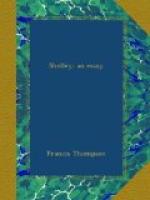SHELLEY: AN ESSAY
The Church, which was once the mother of poets no less than of saints, during the last two centuries has relinquished to aliens the chief glories of poetry, if the chief glories of holiness she has preserved for her own. The palm and the laurel, Dominic and Dante, sanctity and song, grew together in her soil: she has retained the palm, but forgone the laurel. Poetry in its widest sense, {1} and when not professedly irreligious, has been too much and too long among many Catholics either misprised or distrusted; too much and too generally the feeling has been that it is at best superfluous, at worst pernicious, most often dangerous. Once poetry was, as she should be, the lesser sister and helpmate of the Church; the minister to the mind, as the Church to the soul. But poetry sinned, poetry fell; and, in place of lovingly reclaiming her, Catholicism cast her from the door to follow the feet of her pagan seducer. The separation has been ill for poetry; it has not been well for religion.
Fathers of the Church (we would say), pastors of the Church, pious laics of the Church: you are taking from its walls the panoply of Aquinas—take also from its walls the psaltery of Alighieri. Unroll the precedents of the Church’s past; recall to your minds that Francis of Assisi was among the precursors of Dante; that sworn to Poverty he forswore not Beauty, but discerned through the lamp Beauty the Light God; that he was even more a poet in his miracles than in his melody; that poetry clung round the cowls of his Order. Follow his footsteps; you who have blessings for men, have you no blessing for the birds? Recall to your memory that, in their minor kind, the love poems of Dante shed no less honour on Catholicism than did the great religious poem which is itself pivoted on love; that in singing of heaven he sang of Beatrice—this supporting angel was still carven on his harp even when he stirred its strings in Paradise. What you theoretically know, vividly realise: that with many the religion of beauty must always be a passion and a power, that it is only evil when divorced from the worship of the Primal Beauty. Poetry is the preacher to men of the earthly as you of the Heavenly Fairness; of that earthly fairness which God has fashioned to His own image and likeness. You proclaim the day which the Lord has made, and Poetry exults and rejoices in it. You praise the Creator for His works, and she shows you that they are very good. Beware how you misprise this potent ally, for hers is the art of Giotto and Dante: beware how you misprise this insidious foe, for hers is the art of modern France and of Byron. Her value, if you know it not, God knows, and know the enemies of God. If you have no room for her beneath the wings of the Holy One, there is place for her beneath the webs of the Evil One: whom you discard, he embraces; whom you cast down from an honourable seat, he will




